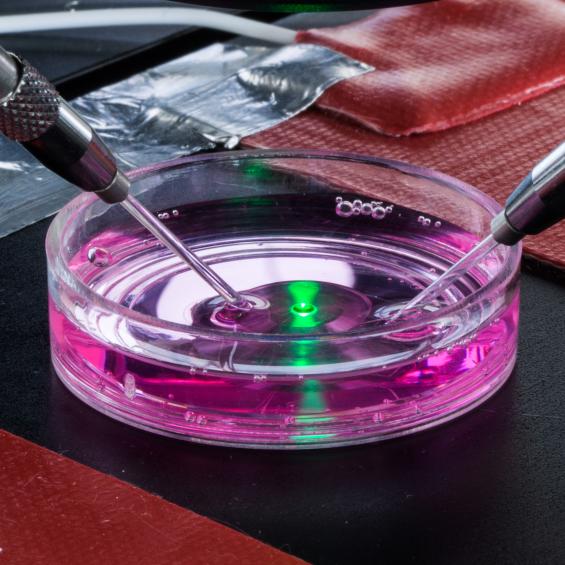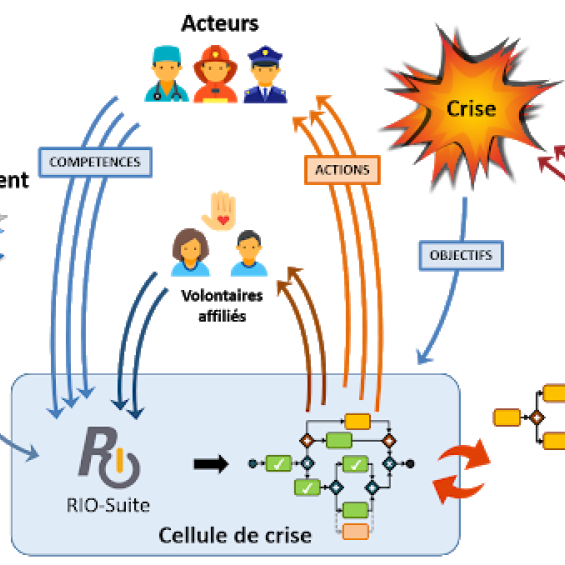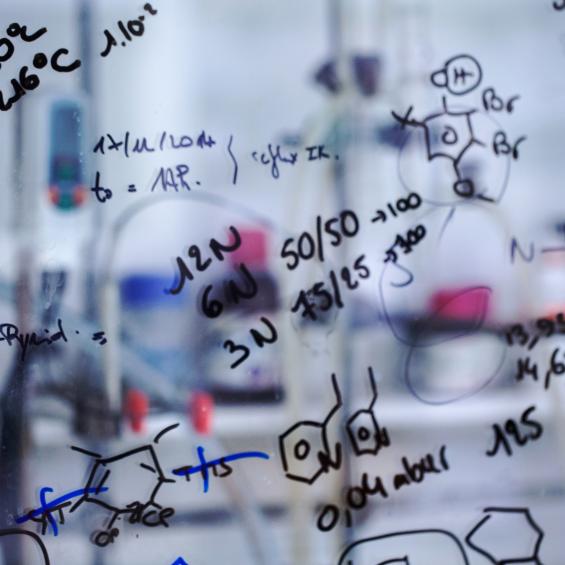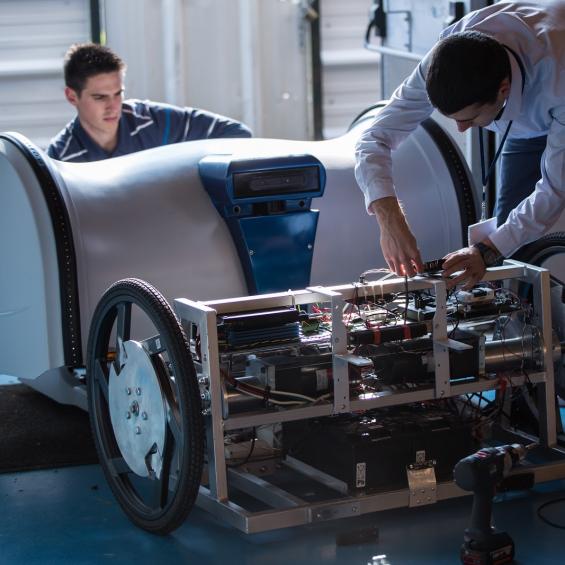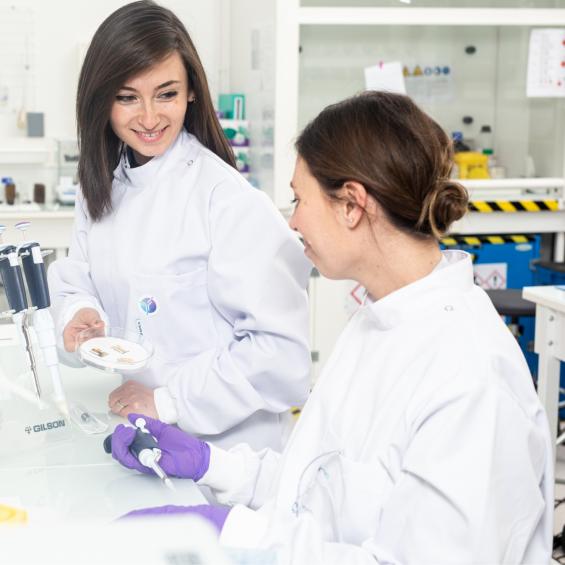IP Paris Doctoral School
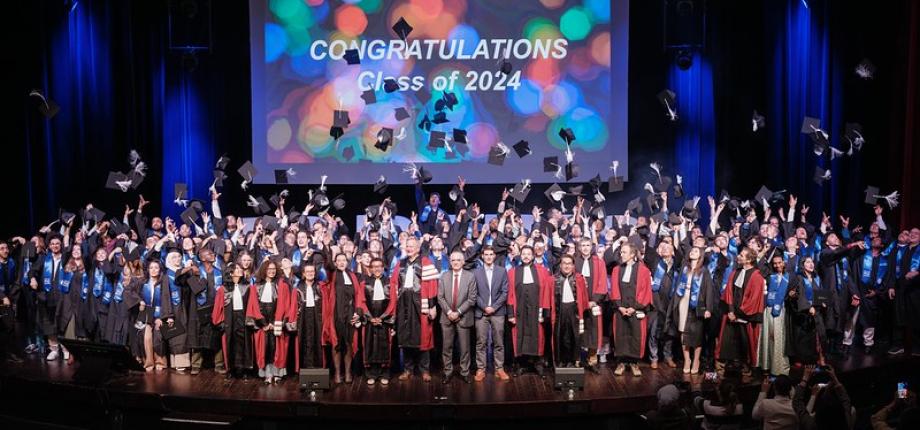
The doctoral school hosts around 900 doctoral students, supervised by more than 800 researchers (including 550 HDRs), in 30 research laboratories (UMR CNRS, INRIA, CEA), which offers a very important scientific strike force, demonstrated by their great national and international reputation and the high level of recognition achieved by the most eminent researchers. In addition to the academic environment of excellence, ED IP Paris also benefits from an important industrial connection (THALES, EDF, DANONE …), allowing the development of industrial partnership in particular with industrial R&D laboratories in Saclay. ED IP Paris offers a rich doctoral training through the research component ranging from basic research to applied research.The doctoral school of the lnstitut Polytechnique de Paris is extremely open to international recruitment (currently, foreign doctoral students represent 45% of PhD students).
The PhD program at ED IP Paris prepares students for successful scientific career opportunities (research, teaching, project management, etc.) in universities and the private sector. For general information, please contact the Administrative Department of the ED IP Paris.
For all the general provisions relative to the role of the doctoral school and the organization of the doctorate program, each doctoral student and each thesis supervisor is subject to the thesis charter and all general procedures of the Institut Polytechnique de Paris (IP Paris) or HEC Paris (according to the affiliation of the thesis supervisor). The purpose of the Rules of Procedure is to set down the practical terms for the implementation of these provisions and to specify the policy of the Doctoral School.
The composition of the Council board is defined in Article 9 of the Decree of May 25, 2016 (modified by the Decree of August 26, 2022).
- Consult the composition of the Council Board
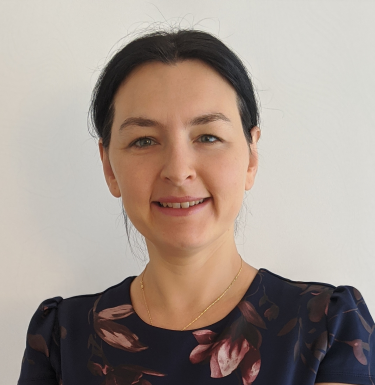
Admission is subject to the submission of an application file via the ADUM platform
There are two possible ways to be admitted to a PhD program at IP Paris Doctoral School Establish contact with a researcher holding HDR (habilitation) at one of the laboratories of the Institute Polytechnique de Paris and develop a thesis project along with an application for funding. Typically, this process is initiated in the midst of the second year (M2), coinciding with the selection of a research internship. After compiling the necessary documents, including comprehensive details of the thesis project, CV, M2 transcript of grades, and a letter of motivated support from the thesis supervisor, agreements between the laboratory and the hosting doctoral school can be secured. Subsequently, the application is to be submitted through ADUM.
The academic period is from September 1st to August 31st of the year following your re-registration. Re-registrations must be completed between September 1st and August 31st, irrespective of the thesis starting date. Doctoral students in their 4th year who successfully defend their thesis before December 31st are exempt from re-registration, tuition fees, and the obligation to subscribe to the CVEC.
Full tuition fees will be charged for any academic year commenced, with no prorated fee, irrespective of the thesis start date.
The Institut Polytechnique de Paris implements a doctoral admission policy that aims to adhere to the following principles :
Explicit and public criteria and procedures made known to all members of the institution and the potential doctoral candidates
Consideration of the personalized and high-quality supervision within the units and research teams
Recruitment that promotes gender equality, diversity, and openness, particularly on the international level
A recruitment encouraging the development of new research avenues and attentive to consider the professional integration prospects and career development of the doctors
Possible guidance or direction
The Institut Polytechnique de Paris supports multiple types of funding :
The programs financially supported or coordinated by the Institut Polytechnique de Paris (For example : MESR, AMX, Hi! PARIS, EUR Plasmas, E4C and E4H).
Supported funding by research organizations (For example : ONERA, CEA and CNRS)
Supported funding by other organizations
The Institut Polytechnique de Paris organizes two calls :
Early call
Final call
The Doctoral School considers in the selection of the doctoral candidates :
The academic results previously obtained by the candidate, notably during the higher education period
The candidate’s research ability, particularly evaluated from the beginning of the research internship period
The alignment between the candidate’s education and the doctoral project
The originality and the feasibility of the doctoral project within the context of the research unit and its partners
The doctoral project’s alignment with the scientific policy of the research unit, through the approval of the director of the research unit during the registration
The availability and the capacity of the thesis directors and all supervisors to ensure the scientific guidance of the doctoral project
A career project expressed by the candidate and its coherence with the doctoral project
The terms of choice and selection of the doctoral candidates are subject to a procedure defined by the executive office and approved by the Doctoral School council.
The candidate’s file requires the following information:
- The application form
- Curriculum Vitae
- Cover letter
- M1 & M2 transcripts or other international diplomas
- Two recommendation letters
Supervisors’ opinions for each application on its subject
Laboratory directors’ opinions for each application in their laboratory
Pre-selection of candidates’ applications by scientific domains of the Doctoral School for the interview, based on the application file
Each application will be examined by the jury, taking into account the academic background (including internships completed by the candidate), the quality of supervision, the alignment of the candidate’s profile with the thesis topic, and potential interdisciplinarity, and also providing an overall rating
The IP Paris Arbitration Board/Commission
Interviews by scientific fields
The interviews can take place in French or English
The interviews shall include the following elements :
- Briefly (~2’): Presentation of the Curriculum Vitae (academic course, internships…)
- Presentation of the thesis subject (~5-10’): The candidates should be able to clearly explain the subject, its challenges and issues as a whole, including the aspects within the field of a discipline other than the candidate’s original subject if it is interdisciplinary
- Briefly (~2’): Motivation for the subject and professional prospects/perspectives.
- The presentation will be followed by a Q&A session (5-10 minutes)
At the end of the auditions, the evaluations could be updated by the members of the disciplinary jury considering the candidates’ performance.
The jury of the final arbitration will include:(the same person can represent several entities)
The Director of the IP Paris Doctoral School
The Director or Deputy Director representing the EDMH
The Research Vice-President of IP ParisA representative per institution whose thesis funding is concerned by the competition
A representative of each disciplinary jury
A representative of each IP Paris Doctoral School field
A representative of the jury of Hi! PARIS/E4C/E4H/etc
Early Call
- Deadline for thesis subject deposits on ADUM: January 15, 2026
- Deadline for applications on ADUM: February 17, 2026
- Interview of candidates: From March 9-16, 2026
- Publishing of the early call results: Beginning of April 2026
Final call
- Deadline for thesis subject submission on ADUM: March 14, 2026
- Deadline for applications on ADUM: April 15, 2026
- Interview of candidates: From May 12-23, 2026
- Publishing of the final call results: Beginning of June 2026
As part of the monitoring committee of doctoral students enrolled at the IP Paris Doctoral School, we request that a presentation be organized in the presence of both members of the individual monitoring committee, before each re-enrollment during the PhD. We thank you for having accepted this role.
The individual/follow-up monitoring committee of the doctoral student ensures that the PhD proceeds smoothly, relying on the Doctoral Charter and the individual training agreement. During interviews with the doctoral student, it assesses the conditions of their doctoral training and the progress of their research. It issues recommendations and transmits the report to the director of the doctoral school, the domain heads, the doctoral student, and the thesis supervisor. It is particularly responsible for preventing any form of conflict, discrimination, or harassment.
To support committee members in their duties, the National Network of Doctoral Colleges has published a guide for doctoral students’ Individual Monitoring Committees (CSI), which can be consulted at this link.
Submission of the individual monitoring committee’s report is a prerequisite for registration for the following year.
Presentations are organized under the responsibility and at the initiative of the thesis supervisor. The procedures are as follows:
- Two weeks before the presentation, the doctoral student sends a manuscript (maximum 10 pages excluding references) introducing the topic, the work carried out and results obtained, as well as projected progress up to the defense, along with a list of all communications and possible publications, and a CV.
- Two weeks before the presentation, the doctoral student also provides their career plan, the list of training courses completed and planned, as well as the prefilled committee report form with the relevant data.
- The doctoral student gives their presentation (20–25 minutes followed by questions and answers) to the two members of the monitoring committee, one of whom is designated as chair, followed by a meeting of the committee members with the thesis supervisor alone and then a meeting with the doctoral student alone.
- A consensus report is drafted by the two external members of the monitoring committee, signed by the chair. This report is sent to the doctoral student and the thesis supervisor, who may add comments. It is then submitted to the domain head.
We ask you to attend the doctoral student’s presentation and to meet with them one-on-one, then with their thesis supervisor, to assess whether the PhD is progressing satisfactorily. Following this presentation, please complete the attached form and send it to both the doctoral student and the thesis supervisor.
The report should briefly address the following points:
- Relevance of the work carried out
- Assessment of what remains to be done
- Opinion on the proposed defense schedule
- Survey on the doctoral student’s plans after their PhD
- Scientific production (publications, software, reports, etc.)
Evaluation and reporting of any situation of conflict, harassment, discrimination, gender-based or sexual violence (HDVSS)
In addition to personalized training through research acquired during the activity within the research unit, the doctoral training also includes the participation in different collective drills intended :
to fortify the scientific culture of the doctoral students, especially in their scientific field
to prepare their professional integration or the pursuit of their career in both the public and private sectors
to encourage their international exposure
These trainings are of three types: scientific, linguistic, and transversal. The latter including ethics and scientific integrity, is a part of the training obligations for all doctoral students, pursuant to the decree of 25 May 2016 (modified on 26 August 2022) on the PhD degree.
The trainings should help the doctoral student on one hand to be more effective in his/her doctoral project and on the other hand to prepare his/her professional future. The training choice will have to be done according to these two objectives and will be able to rely on the earnest advice of the thesis supervisor.
Each doctoral student ought to pursue on the duration of his/her thesis at least 100 hours of training distributed as follows:
Scientific trainings: 40 to 60 hrs including 20 opening hrs (off thesis subject);
Transversal trainings: 40 to 60 hrs including mandatory ethics training.
Language trainings : 0 to 20 hrs
IP Paris Label "European Doctorate"
The Institut Polytechnique de Paris issues the “European Doctorate” or “Doctor Europaeus” label. It applies to the national doctoral diploma, already recognized internationally within the framework of the L.M.D system, and which allows the recognition of the European dimension of the doctoral project. Further information
Thesis Cover Template (Docx) (in french)
Video conference (in french)
After defense
Diploma issuance process (in french)
Correction Form (STEP) (in french)
PhD thesis awards
The teaching and research departments of the Institut Polytechnique de Paris annually award department thesis Prizes, which recognize doctoral work of exceptional scientific quality and particularly innovative character. Among the department-level laureates, the Institut Polytechnique de Paris then awards the Grand thesis Prize to the most outstanding thesis in terms of scientific contribution.
CALENDAR 2026
STEPS | DATES |
| First call for applications | 19 December 2025 |
| Second call for applications | 9 January 2026 |
| Opening of application platform | 9 January 2026 |
| Application deadline | 15 February 2026 |
| Candidate list sent to departments | 17 February 2026 |
| Files sent to departments | 17 February 2026 |
| Department deliberations | Early April 2026 |
| Arbitration Committee meeting | Mid-April 2026 |
| Publication of results | After the jury |
| Award Ceremony | May/June 2026 (graduation ceremony) |
Applicants must have been enrolled as PhD students at Institut Polytechnique de Paris in one of the two doctoral schools of IP Paris (ED IP Paris or EDMH). The research work must have been carried out in a laboratory of IP Paris. The thesis defense must have taken place between January 1, 2025 and December, 31 2025 and must have led to a PhD degree. All research fields are eligible.
Consult the procedure
You must log in to your ADUM personal account to apply
PhD thesis awards 2025 IP Paris
- Souhaib Attaiki (department Computer Science, Data, and Artificial Intelligence)
- Le Ludec Clément (department Economics, Management, and Social Sciences)
- Bounhar Abdelaziz (department Information, communications, and electronics)
- Andres Raphaela (department Economics)
- Boillet Alice (department Mechanics, and Energetics)
- Goujaud Baptiste (département Mathématiques)
- Vilatte Matthieu (department Physics)
- Bechara Rafaela (department Chemistry)
- Novikov Nikita (department Biology)
PhD thesis awards 2024 IP Paris
The Grand thesis Prize
- Mahieu Nolwenn (department Chemistry)
Department thesis Prizes
- Mwamsojo Nickson (département Information, communications, électronique)
- Bombar Maxime (department Computer Science, Data, and Artificial Intelligence)
- Nimier-David Elio (department Economics)
- Grivet Rodolphe (department Mechanics, and Energetics)
- Scetbon Meyer (department Mathematics)
- Chakrani Jaafar (department Physics)
PhD thesis awards 2023 IP Paris
The Grand thesis Prize
- Guerrier Sterenn (department Information, communications, and electronics)
- Park Junha (department Physics)
Department thesis Prizes
- Boyer Marin (department Mathematics)
- Leroux Antonin (department Computer Science, Data, and Artificial Intelligence)
- Moscatelli Marco (department Mechanics, and Energetics)
- Toussaint Camille (département Sciences Sociales et Management)
- Tricoire Maxime (department Chemistry)
- Bo Zhuang (department Biology)
PhD thesis awards 2022 IP Paris
- Boutillon Arthur (department Biology)
- Daudel Kamélia (department Mathematics)
- Dessalles Claire (department Mechanics, and Energetics)
- Dong Bozhang (department Information, communications, and electronics)
- Falmagne Guillaume (department Physics)
- Feret Antoine (department Economics)
- Nadjhai Kimia (department Computer Science, Data, and Artificial Intelligence)
The Golden Rules for PhD supervision provide a set of best practices for both PhD students and supervisors. These rules emphasise the shared responsibility and expectations of both the supervisor and PhD student.
Page under construction
Consult the Doctoral Charter (in french)
If you need a letter of support from the doctoral school for your CIFRE thesis
Graduate School IP
Télécom Paris
19, place Marguerite Perey
5ème étage - CS 20031
F-91123 Palaiseau Cedex
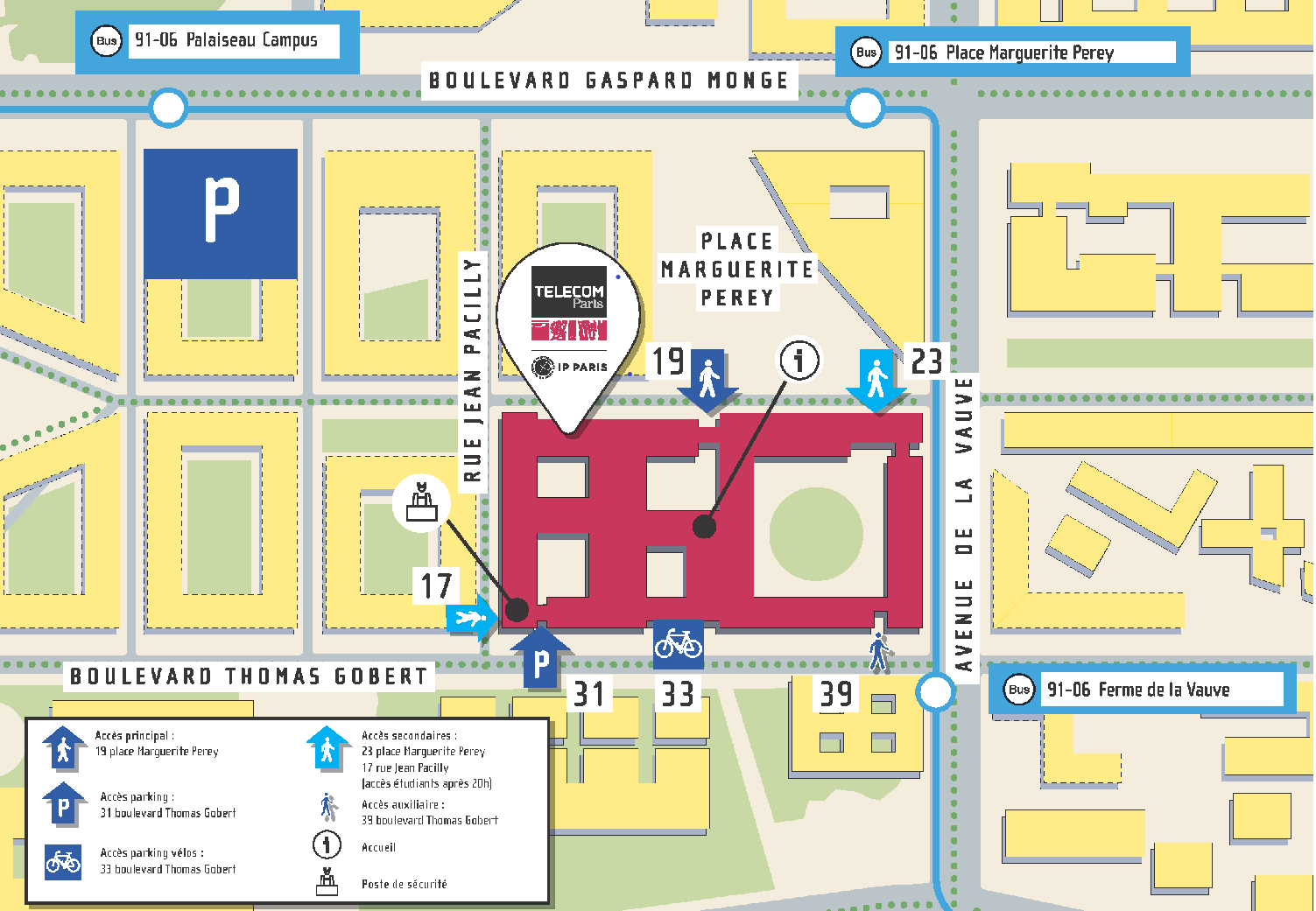
The doctoral school hosts around 900 doctoral students, supervised by more than 800 researchers (including 550 HDRs), in 30 research laboratories (UMR CNRS, INRIA, CEA), which offers a very important scientific strike force, demonstrated by their great national and international reputation and the high level of recognition achieved by the most eminent researchers. In addition to the academic environment of excellence, ED IP Paris also benefits from an important industrial connection (THALES, EDF, DANONE …), allowing the development of industrial partnership in particular with industrial R&D laboratories in Saclay. ED IP Paris offers a rich doctoral training through the research component ranging from basic research to applied research.The doctoral school of the lnstitut Polytechnique de Paris is extremely open to international recruitment (currently, foreign doctoral students represent 45% of PhD students).
The PhD program at ED IP Paris prepares students for successful scientific career opportunities (research, teaching, project management, etc.) in universities and the private sector. For general information, please contact the Administrative Department of the ED IP Paris.
For all the general provisions relative to the role of the doctoral school and the organization of the doctorate program, each doctoral student and each thesis supervisor is subject to the thesis charter and all general procedures of the Institut Polytechnique de Paris (IP Paris) or HEC Paris (according to the affiliation of the thesis supervisor). The purpose of the Rules of Procedure is to set down the practical terms for the implementation of these provisions and to specify the policy of the Doctoral School.
The composition of the Council board is defined in Article 9 of the Decree of May 25, 2016 (modified by the Decree of August 26, 2022).
- Consult the composition of the Council Board

Admission is subject to the submission of an application file via the ADUM platform
There are two possible ways to be admitted to a PhD program at IP Paris Doctoral School Establish contact with a researcher holding HDR (habilitation) at one of the laboratories of the Institute Polytechnique de Paris and develop a thesis project along with an application for funding. Typically, this process is initiated in the midst of the second year (M2), coinciding with the selection of a research internship. After compiling the necessary documents, including comprehensive details of the thesis project, CV, M2 transcript of grades, and a letter of motivated support from the thesis supervisor, agreements between the laboratory and the hosting doctoral school can be secured. Subsequently, the application is to be submitted through ADUM.
The academic period is from September 1st to August 31st of the year following your re-registration. Re-registrations must be completed between September 1st and August 31st, irrespective of the thesis starting date. Doctoral students in their 4th year who successfully defend their thesis before December 31st are exempt from re-registration, tuition fees, and the obligation to subscribe to the CVEC.
Full tuition fees will be charged for any academic year commenced, with no prorated fee, irrespective of the thesis start date.
The Institut Polytechnique de Paris implements a doctoral admission policy that aims to adhere to the following principles :
Explicit and public criteria and procedures made known to all members of the institution and the potential doctoral candidates
Consideration of the personalized and high-quality supervision within the units and research teams
Recruitment that promotes gender equality, diversity, and openness, particularly on the international level
A recruitment encouraging the development of new research avenues and attentive to consider the professional integration prospects and career development of the doctors
Possible guidance or direction
The Institut Polytechnique de Paris supports multiple types of funding :
The programs financially supported or coordinated by the Institut Polytechnique de Paris (For example : MESR, AMX, Hi! PARIS, EUR Plasmas, E4C and E4H).
Supported funding by research organizations (For example : ONERA, CEA and CNRS)
Supported funding by other organizations
The Institut Polytechnique de Paris organizes two calls :
Early call
Final call
The Doctoral School considers in the selection of the doctoral candidates :
The academic results previously obtained by the candidate, notably during the higher education period
The candidate’s research ability, particularly evaluated from the beginning of the research internship period
The alignment between the candidate’s education and the doctoral project
The originality and the feasibility of the doctoral project within the context of the research unit and its partners
The doctoral project’s alignment with the scientific policy of the research unit, through the approval of the director of the research unit during the registration
The availability and the capacity of the thesis directors and all supervisors to ensure the scientific guidance of the doctoral project
A career project expressed by the candidate and its coherence with the doctoral project
The terms of choice and selection of the doctoral candidates are subject to a procedure defined by the executive office and approved by the Doctoral School council.
The candidate’s file requires the following information:
- The application form
- Curriculum Vitae
- Cover letter
- M1 & M2 transcripts or other international diplomas
- Two recommendation letters
Supervisors’ opinions for each application on its subject
Laboratory directors’ opinions for each application in their laboratory
Pre-selection of candidates’ applications by scientific domains of the Doctoral School for the interview, based on the application file
Each application will be examined by the jury, taking into account the academic background (including internships completed by the candidate), the quality of supervision, the alignment of the candidate’s profile with the thesis topic, and potential interdisciplinarity, and also providing an overall rating
The IP Paris Arbitration Board/Commission
Interviews by scientific fields
The interviews can take place in French or English
The interviews shall include the following elements :
- Briefly (~2’): Presentation of the Curriculum Vitae (academic course, internships…)
- Presentation of the thesis subject (~5-10’): The candidates should be able to clearly explain the subject, its challenges and issues as a whole, including the aspects within the field of a discipline other than the candidate’s original subject if it is interdisciplinary
- Briefly (~2’): Motivation for the subject and professional prospects/perspectives.
- The presentation will be followed by a Q&A session (5-10 minutes)
At the end of the auditions, the evaluations could be updated by the members of the disciplinary jury considering the candidates’ performance.
The jury of the final arbitration will include:(the same person can represent several entities)
The Director of the IP Paris Doctoral School
The Director or Deputy Director representing the EDMH
The Research Vice-President of IP ParisA representative per institution whose thesis funding is concerned by the competition
A representative of each disciplinary jury
A representative of each IP Paris Doctoral School field
A representative of the jury of Hi! PARIS/E4C/E4H/etc
Early Call
- Deadline for thesis subject deposits on ADUM: January 15, 2026
- Deadline for applications on ADUM: February 17, 2026
- Interview of candidates: From March 9-16, 2026
- Publishing of the early call results: Beginning of April 2026
Final call
- Deadline for thesis subject submission on ADUM: March 14, 2026
- Deadline for applications on ADUM: April 15, 2026
- Interview of candidates: From May 12-23, 2026
- Publishing of the final call results: Beginning of June 2026
As part of the monitoring committee of doctoral students enrolled at the IP Paris Doctoral School, we request that a presentation be organized in the presence of both members of the individual monitoring committee, before each re-enrollment during the PhD. We thank you for having accepted this role.
The individual/follow-up monitoring committee of the doctoral student ensures that the PhD proceeds smoothly, relying on the Doctoral Charter and the individual training agreement. During interviews with the doctoral student, it assesses the conditions of their doctoral training and the progress of their research. It issues recommendations and transmits the report to the director of the doctoral school, the domain heads, the doctoral student, and the thesis supervisor. It is particularly responsible for preventing any form of conflict, discrimination, or harassment.
To support committee members in their duties, the National Network of Doctoral Colleges has published a guide for doctoral students’ Individual Monitoring Committees (CSI), which can be consulted at this link.
Submission of the individual monitoring committee’s report is a prerequisite for registration for the following year.
Presentations are organized under the responsibility and at the initiative of the thesis supervisor. The procedures are as follows:
- Two weeks before the presentation, the doctoral student sends a manuscript (maximum 10 pages excluding references) introducing the topic, the work carried out and results obtained, as well as projected progress up to the defense, along with a list of all communications and possible publications, and a CV.
- Two weeks before the presentation, the doctoral student also provides their career plan, the list of training courses completed and planned, as well as the prefilled committee report form with the relevant data.
- The doctoral student gives their presentation (20–25 minutes followed by questions and answers) to the two members of the monitoring committee, one of whom is designated as chair, followed by a meeting of the committee members with the thesis supervisor alone and then a meeting with the doctoral student alone.
- A consensus report is drafted by the two external members of the monitoring committee, signed by the chair. This report is sent to the doctoral student and the thesis supervisor, who may add comments. It is then submitted to the domain head.
We ask you to attend the doctoral student’s presentation and to meet with them one-on-one, then with their thesis supervisor, to assess whether the PhD is progressing satisfactorily. Following this presentation, please complete the attached form and send it to both the doctoral student and the thesis supervisor.
The report should briefly address the following points:
- Relevance of the work carried out
- Assessment of what remains to be done
- Opinion on the proposed defense schedule
- Survey on the doctoral student’s plans after their PhD
- Scientific production (publications, software, reports, etc.)
Evaluation and reporting of any situation of conflict, harassment, discrimination, gender-based or sexual violence (HDVSS)
In addition to personalized training through research acquired during the activity within the research unit, the doctoral training also includes the participation in different collective drills intended :
to fortify the scientific culture of the doctoral students, especially in their scientific field
to prepare their professional integration or the pursuit of their career in both the public and private sectors
to encourage their international exposure
These trainings are of three types: scientific, linguistic, and transversal. The latter including ethics and scientific integrity, is a part of the training obligations for all doctoral students, pursuant to the decree of 25 May 2016 (modified on 26 August 2022) on the PhD degree.
The trainings should help the doctoral student on one hand to be more effective in his/her doctoral project and on the other hand to prepare his/her professional future. The training choice will have to be done according to these two objectives and will be able to rely on the earnest advice of the thesis supervisor.
Each doctoral student ought to pursue on the duration of his/her thesis at least 100 hours of training distributed as follows:
Scientific trainings: 40 to 60 hrs including 20 opening hrs (off thesis subject);
Transversal trainings: 40 to 60 hrs including mandatory ethics training.
Language trainings : 0 to 20 hrs
IP Paris Label "European Doctorate"
The Institut Polytechnique de Paris issues the “European Doctorate” or “Doctor Europaeus” label. It applies to the national doctoral diploma, already recognized internationally within the framework of the L.M.D system, and which allows the recognition of the European dimension of the doctoral project. Further information
Thesis Cover Template (Docx) (in french)
Video conference (in french)
After defense
Diploma issuance process (in french)
Correction Form (STEP) (in french)
PhD thesis awards
The teaching and research departments of the Institut Polytechnique de Paris annually award department thesis Prizes, which recognize doctoral work of exceptional scientific quality and particularly innovative character. Among the department-level laureates, the Institut Polytechnique de Paris then awards the Grand thesis Prize to the most outstanding thesis in terms of scientific contribution.
CALENDAR 2026
STEPS | DATES |
| First call for applications | 19 December 2025 |
| Second call for applications | 9 January 2026 |
| Opening of application platform | 9 January 2026 |
| Application deadline | 15 February 2026 |
| Candidate list sent to departments | 17 February 2026 |
| Files sent to departments | 17 February 2026 |
| Department deliberations | Early April 2026 |
| Arbitration Committee meeting | Mid-April 2026 |
| Publication of results | After the jury |
| Award Ceremony | May/June 2026 (graduation ceremony) |
Applicants must have been enrolled as PhD students at Institut Polytechnique de Paris in one of the two doctoral schools of IP Paris (ED IP Paris or EDMH). The research work must have been carried out in a laboratory of IP Paris. The thesis defense must have taken place between January 1, 2025 and December, 31 2025 and must have led to a PhD degree. All research fields are eligible.
Consult the procedure
You must log in to your ADUM personal account to apply
PhD thesis awards 2025 IP Paris
- Souhaib Attaiki (department Computer Science, Data, and Artificial Intelligence)
- Le Ludec Clément (department Economics, Management, and Social Sciences)
- Bounhar Abdelaziz (department Information, communications, and electronics)
- Andres Raphaela (department Economics)
- Boillet Alice (department Mechanics, and Energetics)
- Goujaud Baptiste (département Mathématiques)
- Vilatte Matthieu (department Physics)
- Bechara Rafaela (department Chemistry)
- Novikov Nikita (department Biology)
PhD thesis awards 2024 IP Paris
The Grand thesis Prize
- Mahieu Nolwenn (department Chemistry)
Department thesis Prizes
- Mwamsojo Nickson (département Information, communications, électronique)
- Bombar Maxime (department Computer Science, Data, and Artificial Intelligence)
- Nimier-David Elio (department Economics)
- Grivet Rodolphe (department Mechanics, and Energetics)
- Scetbon Meyer (department Mathematics)
- Chakrani Jaafar (department Physics)
PhD thesis awards 2023 IP Paris
The Grand thesis Prize
- Guerrier Sterenn (department Information, communications, and electronics)
- Park Junha (department Physics)
Department thesis Prizes
- Boyer Marin (department Mathematics)
- Leroux Antonin (department Computer Science, Data, and Artificial Intelligence)
- Moscatelli Marco (department Mechanics, and Energetics)
- Toussaint Camille (département Sciences Sociales et Management)
- Tricoire Maxime (department Chemistry)
- Bo Zhuang (department Biology)
PhD thesis awards 2022 IP Paris
- Boutillon Arthur (department Biology)
- Daudel Kamélia (department Mathematics)
- Dessalles Claire (department Mechanics, and Energetics)
- Dong Bozhang (department Information, communications, and electronics)
- Falmagne Guillaume (department Physics)
- Feret Antoine (department Economics)
- Nadjhai Kimia (department Computer Science, Data, and Artificial Intelligence)
The Golden Rules for PhD supervision provide a set of best practices for both PhD students and supervisors. These rules emphasise the shared responsibility and expectations of both the supervisor and PhD student.
Page under construction
Consult the Doctoral Charter (in french)
If you need a letter of support from the doctoral school for your CIFRE thesis
Graduate School IP
Télécom Paris
19, place Marguerite Perey
5ème étage - CS 20031
F-91123 Palaiseau Cedex















